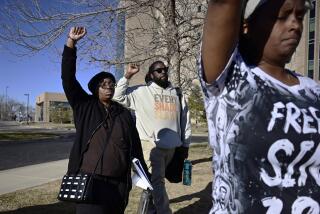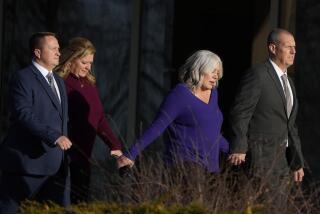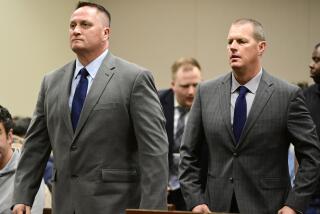2nd Team of Paramedics Broke Rules in Death Case
- Share via
A team of paramedics had been called twice to the residence of a crippled San Pedro alcoholic on the day before he died, but dismissed both calls as false alarms, The Times has learned.
Los Angeles Fire Department officials confirmed that a paramedic team was summoned twice to Melvin Wagner’s hotel Sept. 22--the day before paramedic Robert Dougherty is accused of refusing to take the dying man to the hospital.
On their first call to the hotel, this team failed to take Wagner’s vital signs or transport him to the hospital, law enforcement officials said. On the second call, the paramedics apparently failed to respond, authorities said.
20 Misdemeanor Counts
Dougherty, 49, was ordered to stand trial Thursday on one felony count of falsifying government documents and 20 misdemeanor counts of gross negligence, incompetence and acting outside the scope of his responsibilities in connection with the three emergency calls he made to Wagner’s hotel on Sept. 23.
But law enforcement and fire department officials confirmed after Dougherty’s preliminary hearing that there is evidence that a second team of paramedics also failed to treat Wagner during the 24 hours before his death.
Deputy Dist. Atty. Brian R. Kelberg, who is prosecuting the Dougherty case, said the paramedic team did not even return to the hotel on the second occasion, believing it was simply another call to assist Wagner.
But Kelberg and Leonard Inch, who heads paramedic investigations for the Los Angeles County Department of Health Services, said there was insufficient evidence to take action against the other team.
“We did look at those two separate calls and we did not feel there was sufficient evidence to proceed,” Inch said. “That does not mean that there wasn’t anything wrong. It means what I said: It means there was not sufficient evidence to proceed.”
Wagner, 42, a partially paralyzed man with a history of alcohol problems, died a little more than an hour after Dougherty and his partner, James Mihalka, concluded their second visit to his hotel.
Mihalka testified that Dougherty had refused to heed Wagner’s pleas to be taken to the hospital after Wagner admitted that he had been ill for four months. Dougherty refused to even look at Wagner on the second call to the hotel, though Wagner’s social worker said the man was gasping for breath, Mihalka said.
A variety of witnesses testified that Dougherty, a Los Angeles Fire Department employee for more than 20 years, was required by county regulations to at least take vital signs of a patient claiming to be ill.
But the new disclosures indicate that two other department paramedics, Tom Kelly and Kim Goldhammer, had visited Wagner’s hotel the previous day and also had neglected to take the man’s vital signs.
Fire Department spokesman Dean Cathey said department records show that the first call to Melvin’s Flint Street hotel came at 6:43 p.m. on the evening of Sept. 22. The second occurred at 7:15 p.m. Both were listed on department records as false alarms, Cathey said.
Kelberg said Kelly and Goldhammer told investigators that Wagner had not wanted to be transported to the hospital after their first visit to his residence.
“They had not returned to the station after the first call when the second one came in. They said, ‘We were just out there,’ and as a result, didn’t go,” Kelberg said. However, there is evidence that the second call may have been made on behalf of another resident of the same hotel, Kelberg said.
Kelly has since retired from the department. Goldhammer is still on active duty. Neither could be reached for comment Thursday.
Dougherty is scheduled to be arraigned in Superior Court on Feb. 3. He was removed from paramedic duty after the incident and left city employment in January, 1987, on a disability retirement, collecting 45% of his salary.
City officials said Dougherty claimed problems with his left shoulder, both knees and his spine in addition to hearing loss and a hernia stemming from his job.
Dougherty’s attorney, Elfriede Shook, said the revelation that paramedics had visited Wagner on the previous day is evidence that Dougherty had no way of knowing how ill the man was.
“They also found that it was a false alarm, that Mr. Wagner was not in critical condition and (that) it was not necessary to transport him,” she said.
“A lot of people call the paramedics on a continuing basis, just to have them come out. They don’t want to get their own ambulance, and this was a case like that in his (Dougherty’s) mind,” Shook added.
More to Read
Sign up for Essential California
The most important California stories and recommendations in your inbox every morning.
You may occasionally receive promotional content from the Los Angeles Times.













